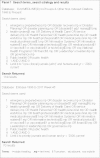A health system approach to all-hazards disaster management: A systematic review
- PMID: 23066519
- PMCID: PMC3461969
- DOI: 10.1371/50081cad5861d
A health system approach to all-hazards disaster management: A systematic review
Abstract
AIM This review aims to develop disaster management practice using a health system strengthening approach through two objectives. Firstly, to review the disaster management literature to test the hypothesis that a holistic health system approach has not been established in practice or evaluated in the core literature. Secondly, to collate the worldwide experience of disaster management found in the core literature according to the components of a health system. METHOD A systematic review was conducted of the core literature published between January 2000 and November 2011 on the MEDLINE and Embase databases. Search terms combined the WHO's descriptors for a health system with disaster terms. Non-restrictive inclusion criteria were applied. Papers were assessed using a quality appraisal tool. Content analysis identified the disaster management components discussed within the context of the health system. RESULTS The search yielded 143 relevant disaster management documents for collation. The review found that none of these publications described a holistic health system approach to disaster management, and none evaluated such an approach. CONCLUSION The findings of this review demonstrate that a holistic health system approach to disaster management has not been established in practice or evaluated in the core literature. Important lessons identified through the collation and analyses of isolated disaster-related experience require further research to incorporate them within a holistic health system approach. This approach, supported by the resolution passed at the World Health Assembly in 2011, aims to build health system resilience to protect immediate and long-term population health in the face of all-hazards disasters.
Citation: Bayntun C. A health system approach to all-hazards disaster management: A systematic review. PLOS Currents Disasters. 2012 Aug 22. doi: 10.1371/50081cad5861d.
Figures
References
-
- World Health Assembly. (2011) 64th World Health Assembly Agenda item 13.4 - Strengthening national health emergency and disaster management capacities and resilience of health systems. [Online] Available from: http://apps.who.int/gb/ebwha/pdf_files/WHA64/A64_R10-en.pdf [Accessed 22 Dec 2011].
-
- WHO. (2007) Everybody's business. Strengthening health systems to improve health outcomes : WHO’s framework for action. . [Online] Available from: http://www.who.int/healthsystems/strategy/everybodys_business.pdf [Accessed July 2011].
-
- WHO. World Health Report 2000. 2000.
-
- Global Assessment of National Health Sector Emergency Preparedness and Response. ; 2008.
LinkOut - more resources
Full Text Sources




